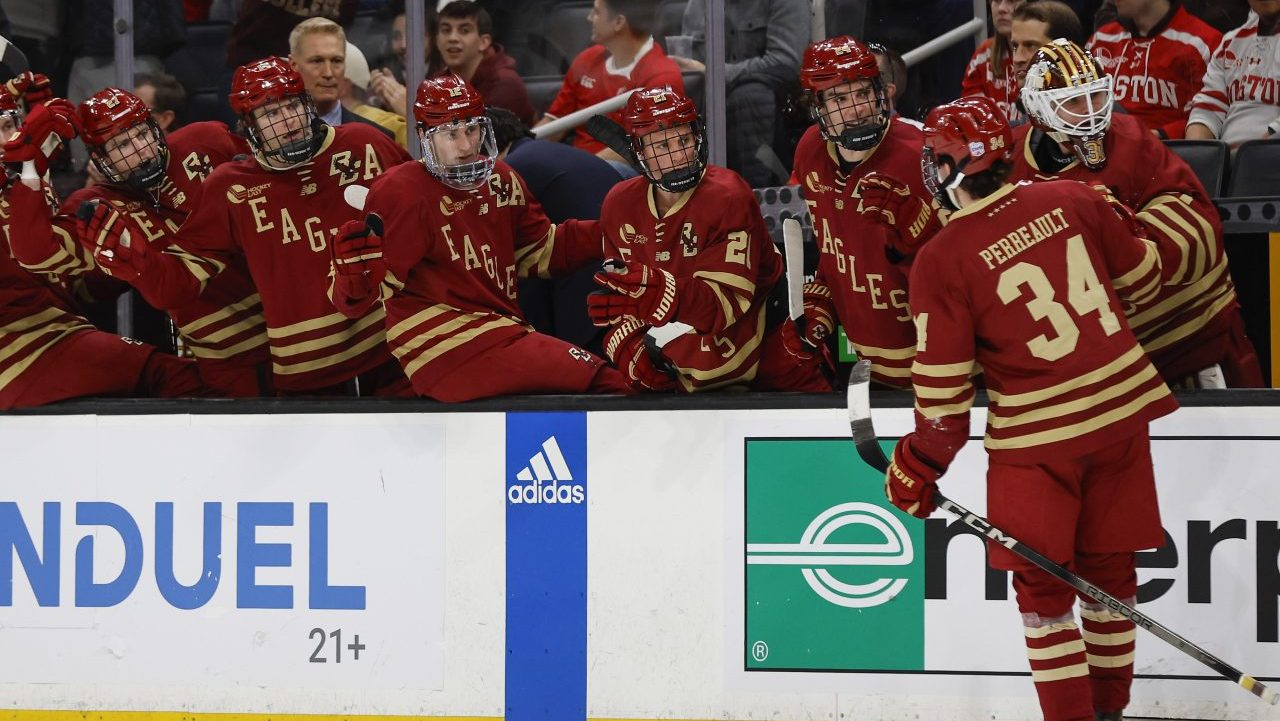
When the puck drops for the first Frozen Four game Thursday afternoon at the Xcel Energy Center in St. Paul, Minn., it’ll mark a battle of men’s ice hockey blue bloods, with a combined 96 appearances in the Frozen Four and 28 national titles among the four teams. The schools—Boston College, Boston University, Denver and Michigan—are arguably the four most prestigious hockey programs of the past century (though Minnesota, which lost to BU in the quarterfinals, could make that claim, as well).
The semifinal games start with third-ranked University of Denver skating against No. 2 Boston University at 5 p.m. ET, followed 10th-ranked Michigan against consensus No. 1 Boston College at 8:30 p.m. CT. The games are sold out, with resale tickets asking for as much as $10,781 a seat for Saturday’s final, according to Ticketmaster. Odds are, in addition to a packed house, it’ll be a TV ratings winner, too. In the stands and on the TV, college hockey has been on a roll.
Regular season attendance for the 64 schools playing top division men’s ice hockey hit more than 3.95 million total this year, a rise of more than 400,000 from 2022-23. More schools are filling more seats too, with attendance hitting 77% of capacity nationally, up from 71% last year—that number equaled the 2018-19 season, the last pre-COVID campaign, according to attendance figures from the publication USCHO.
“It’s hard to say there is a single reason for the attendance increase other than the continued growth of college hockey and the awareness of just how good and entertaining the game is,” said Mike Snee, the executive director of College Hockey Inc., an organization backed mainly by USA Hockey with an NHL grant to promote the men’s and women’s college game. “Certainly, renaissance seasons at schools like Maine and Wisconsin or a new program and beautiful arena at Augustana [a university in South Dakota] contribute. However it just feels like more people, especially students, are realizing that attending a college hockey game is a great way to spend a Friday or Saturday evening.”
If fans can’t get to the arena, they’re watching more on TV too. This year’s regional finals, held two weeks ago, averaged 254,000 viewers across all games, up 50% from last year, according to The NHL Zone. Three of the four games had higher ratings than the comparable 2023 games, headlined by Michigan versus archrival Michigan State drawing 569,000 viewers on ESPN2, up nearly 60% from the comparable Michigan-Penn State game last year.
The 2023 final between relative newcomer Quinnipiac and Minnesota drew 808,000 on ESPN—double the number of viewers the prior year. The past 10 championships averaged 492,000 viewers on ESPN, according to Nielsen data. Last year’s final is near the recent peak of 899,000 households for the 2002 final between Maine and Minnesota, according to ratings data from 1995 through 2010 compiled by BC Interruption, a Boston College sports site published by Vox Media. The lowest-rated final was 1995’s matchup between BU and Minnesota, which aired on ESPN and had just 63,000 households tune in. This year’s games are on ESPN2 and also being streamed on ESPN+.
The apparent uptick in attendance and ratings can probably be credited to the high level of hockey being played at the collegiate level today. Unlike the 1990s and earlier, when NHL prospects would usually go right to the junior leagues to develop their game, college hockey is now packed with NHL talent—at least at the elite levels the teams in this year’s Frozen Four play.
The four schools have 51 draft picks among them, excluding Macklin Celebrini at BU, who has been too young to enter the draft and is likely to go first this year. The BC-Michigan game features six NHL first-rounders, including the Eagles’ Cutter Gauthier, a No. 3 pick widely expected to join the Anaheim Ducks after the conclusion of the season.
With the talent comes big money too: Michigan is the biggest spender of the group—and fourth overall in the nation—with a budget of $4.5 million on hockey in its last disclosed fiscal year, followed by BC at $4.36 million, Denver at $4.1 and BU at $3.7 million.
With assistance from Anthony Crupi and Eben Novy-Williams

